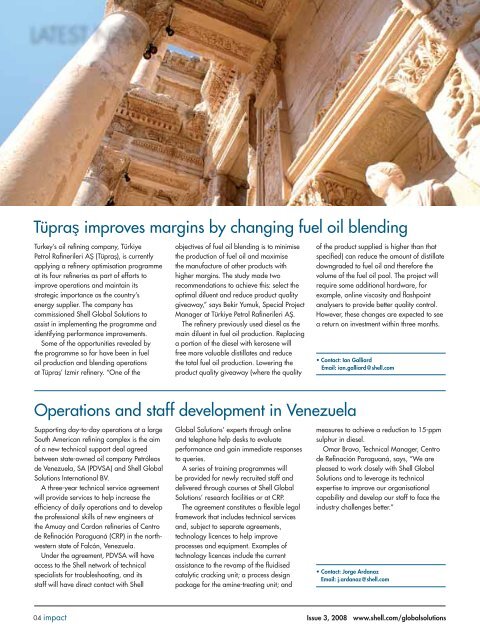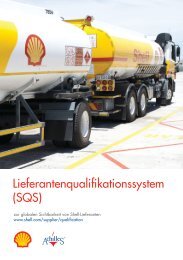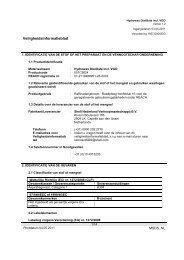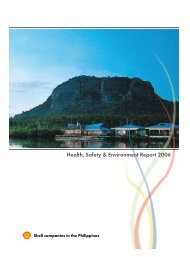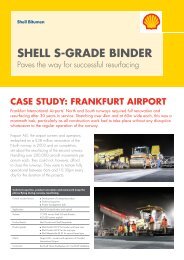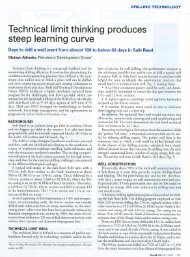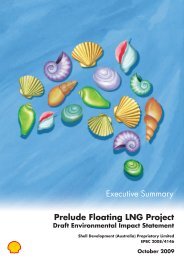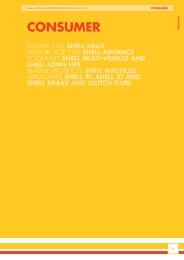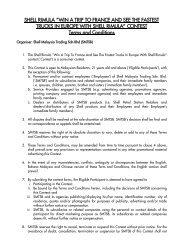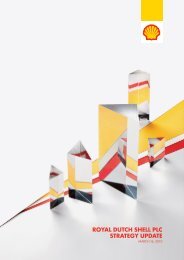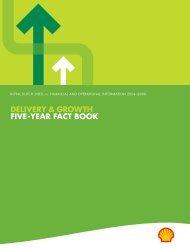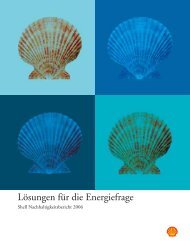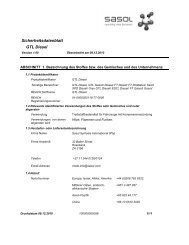Shell Global Solutions - Impact online 2008 Issue 3 - Latest News
Shell Global Solutions - Impact online 2008 Issue 3 - Latest News
Shell Global Solutions - Impact online 2008 Issue 3 - Latest News
Create successful ePaper yourself
Turn your PDF publications into a flip-book with our unique Google optimized e-Paper software.
LATEST NEWS<br />
Tüpraş improves margins by changing fuel oil blending<br />
Turkey’s oil refining company, Türkiye objectives of fuel oil blending is to minimise of the product supplied is higher than that<br />
Petrol Rafi nerileri AŞ (Tüpraş), is currently the production of fuel oil and maximise specified) can reduce the amount of distillate<br />
applying a refinery optimisation programme the manufacture of other products with downgraded to fuel oil and therefore the<br />
at its four refineries as part of efforts to higher margins. The study made two volume of the fuel oil pool. The project will<br />
improve operations and maintain its recommendations to achieve this: select the require some additional hardware, for<br />
strategic importance as the country’s optimal diluent and reduce product quality example, <strong>online</strong> viscosity and flashpoint<br />
energy supplier. The company has giveaway,” says Bekir Yumuk, Special Project analysers to provide better quality control.<br />
commissioned <strong>Shell</strong> <strong>Global</strong> <strong>Solutions</strong> to Manager at Türkiye Petrol Rafi nerileri AŞ. However, these changes are expected to see<br />
assist in implementing the programme and The refinery previously used diesel as the a return on investment within three months.<br />
identifying performance improvements. main diluent in fuel oil production. Replacing<br />
Some of the opportunities revealed by a portion of the diesel with kerosene will<br />
the programme so far have been in fuel free more valuable distillates and reduce<br />
oil production and blending operations the total fuel oil production. Lowering the<br />
at Tüpraş’ Izmir refinery. “One of the product quality giveaway (where the quality<br />
• Contact: Ian Galliard<br />
Email: ian.galliard@shell.com<br />
Operations and staff development in Venezuela<br />
Supporting day-to-day operations at a large <strong>Global</strong> <strong>Solutions</strong>’ experts through <strong>online</strong> measures to achieve a reduction to 15-ppm<br />
South American refining complex is the aim and telephone help desks to evaluate sulphur in diesel.<br />
of a new technical support deal agreed performance and gain immediate responses Omar Bravo, Technical Manager, Centro<br />
between state-owned oil company Petróleos to queries. de Refinación Paraguaná, says, “We are<br />
de Venezuela, SA (PDVSA) and <strong>Shell</strong> <strong>Global</strong> A series of training programmes will pleased to work closely with <strong>Shell</strong> <strong>Global</strong><br />
<strong>Solutions</strong> International BV. be provided for newly recruited staff and <strong>Solutions</strong> and to leverage its technical<br />
A three-year technical service agreement delivered through courses at <strong>Shell</strong> <strong>Global</strong> expertise to improve our organisational<br />
will provide services to help increase the <strong>Solutions</strong>’ research facilities or at CRP. capability and develop our staff to face the<br />
efficiency of daily operations and to develop The agreement constitutes a flexible legal industry challenges better.”<br />
the professional skills of new engineers at framework that includes technical services<br />
the Amuay and Cardon refineries of Centro and, subject to separate agreements,<br />
de Refinación Paraguaná (CRP) in the north technology licences to help improve<br />
western state of Falcón, Venezuela. processes and equipment. Examples of<br />
Under the agreement, PDVSA will have technology licences include the current<br />
access to the <strong>Shell</strong> network of technical assistance to the revamp of the fluidised<br />
specialists for troubleshooting, and its<br />
staff will have direct contact with <strong>Shell</strong><br />
catalytic cracking unit; a process design<br />
package for the amine-treating unit; and<br />
• Contact: Jorge Ardanaz<br />
Email: j.ardanaz@shell.com<br />
04 impact <strong>Issue</strong> 3, <strong>2008</strong> www.shell.com/globalsolutions
Preserving van Gogh’s magic<br />
Fresh light is being shed on the methods Quantities of barium sulphate, a white<br />
and materials Vincent van Gogh used to pigment, were detected in the first layer<br />
create his paintings through a joint research of paint, which indicated that van Gogh<br />
project between the Van Gogh Museum probably used it to dilute the expensive white<br />
in Amsterdam, the Netherlands, <strong>Shell</strong> lead tube paint, a new product at the time.<br />
Nederland BV and <strong>Shell</strong> <strong>Global</strong> <strong>Solutions</strong> “If we can discover what materials<br />
International BV. were used and how, we can sometimes<br />
The project has given art curators a understand how an artist got those<br />
better understanding of what van Gogh’s wonderful effects you see on a<br />
masterpieces originally looked like, and has painting and explain better what<br />
already led to requests to verify the authenticity might have changed since it was<br />
of several paintings. It may also help to stop made,” says Aviva Burnstock, Head<br />
the artist’s works deteriorating further. of the Department of Conservation &<br />
Ralph Haswell, Researcher, <strong>Shell</strong> <strong>Global</strong> Technology at the Courtauld Institute<br />
<strong>Solutions</strong> International BV, and a team of of Art, University of London, UK.<br />
scientists used focused ion beams (FIB) and The researchers have studied<br />
transmission electron microscopy (TEM) to 97 paintings van Gogh created<br />
reveal the composition of different materials between 1886 and 1888, a<br />
in the artist’s paint. period when little is known about his<br />
Using a technique commonly applied techniques. For the full story,<br />
when examining catalysts, minute paint<br />
samples were removed by bombarding the<br />
visit www.shell.com/sw<strong>online</strong>.<br />
surface with FIB. The particles in the samples<br />
were then identified using TEM.<br />
• Contact: Ralph Haswell<br />
Email: ralph.haswell@shell.com<br />
Trackside technical support helps power Ducati to victory<br />
Ducati Corse has enjoyed trackside<br />
technical support for the first time during<br />
a Road Racing World Championship<br />
(MotoGP) Grand Prix as part of its technical<br />
partnership with <strong>Shell</strong>.<br />
<strong>Shell</strong> <strong>Global</strong> <strong>Solutions</strong>’ technicians tested<br />
the <strong>Shell</strong> Advance ‡ race oil and the <strong>Shell</strong><br />
V-Power ‡ race fuel in the Ducati riders’ bikes<br />
at the Sachsenring circuit in Germany during<br />
the July race weekend, when Casey Stoner<br />
stormed to his third consecutive victory.<br />
The testing, conducted in the <strong>Shell</strong> <strong>Global</strong><br />
<strong>Solutions</strong> mobile track laboratory behind<br />
the Ducati pit box, helped to determine<br />
that the <strong>Shell</strong> race fuels and lubricants<br />
were optimised for the benefit of the riders’<br />
performance. Analyses were conducted after<br />
all the riding sessions so that the Ducati team<br />
could detect and rectify any problems.<br />
The technicians were able to confirm<br />
that the <strong>Shell</strong> V-Power race fuel in the<br />
Ducati Desmosedici tanks met Fédération<br />
Internationale de Motocyclisme<br />
requirements and that it was the same fuel<br />
that had left the <strong>Shell</strong> <strong>Global</strong> <strong>Solutions</strong><br />
laboratories in Hamburg.<br />
The technicians also gave the green light<br />
to the <strong>Shell</strong> Advance race oil after trackside<br />
analyses confirmed that the level of wear<br />
metals in the lubricant was within the<br />
expected range.<br />
Luigi Mitolo, Team Technical Coordinator<br />
Assistant, Ducati, says, “Having a technical<br />
partner working physically next door to<br />
the Ducati race team ensured we<br />
had the best possible chance<br />
of optimising performance. <strong>Shell</strong> <strong>Global</strong><br />
<strong>Solutions</strong>’ support underlines a strategic<br />
relationship in which both parties embrace<br />
engineering development.”<br />
• Contact: Peter Fordemann<br />
Email: peter.fordemann@shell.com<br />
LATEST NEWS<br />
‡ <strong>Shell</strong> Advance and <strong>Shell</strong> V-Power are <strong>Shell</strong> trademarks.<br />
<strong>Issue</strong> 3, <strong>2008</strong> www.shell.com/globalsolutions impact 05
Pernis unit offers improved production and energy effi ciency<br />
A new polyol unit has come <strong>online</strong> at the<br />
Pernis chemical manufacturing complex in<br />
the Netherlands to provide an additional<br />
100 k t of capacity while improving the<br />
complex’s environmental footprint.<br />
The unit opened on time and on budget,<br />
and will use less energy and produce<br />
less carbon dioxide compared with units<br />
using traditional polyol manufacturing<br />
processes. The new process also does not<br />
require the use of certain conventional<br />
process chemicals and uses feedstocks<br />
more efficiently, which generates less solid<br />
waste and waste water.<br />
The manufacturing process uses <strong>Shell</strong><br />
<strong>Global</strong> <strong>Solutions</strong>’ technology, which<br />
increases the production capacity for base<br />
Le Mans glory for Audi<br />
polyol grades in a responsible manner.<br />
The new unit will raise the complex’s<br />
polyol capacity to 255 kt a year to help<br />
meet the growing demand for polyols<br />
like slabstock foam, coatings, adhesives,<br />
sealants, elastomers and mouldings.<br />
Sven Royall, Vice President Customer<br />
Services and Intermediates, <strong>Shell</strong><br />
Chemicals, says, “We have successfully<br />
brought the polyols expansion on stream<br />
quickly, safely and efficiently, thus helping<br />
our business in Europe to grow in a<br />
responsible and profitable way.”<br />
• Contact: <strong>Shell</strong>y Linkerhof<br />
Email: shelly.linkerhof@shell.com<br />
For the third consecutive year, <strong>Shell</strong> V-Power ‡ Diesel race fuel has<br />
helped to power the winning Audi Sport team to victory in the<br />
24 Heures du Mans race. But this year’s fuel incorporated nextgeneration<br />
biofuel for the first time in a move that highlighted the role<br />
of <strong>Shell</strong> V-Power Diesel race fuel in testing new technologies and fuels.<br />
A small amount of a biomass to liquids biofuel, developed in<br />
collaboration with CHOREN Industries GmbH, was blended into the<br />
race fuel along with the established gas to liquids (GTL) component,<br />
which has been used in the product since 2006. <strong>Shell</strong> V-Power<br />
Diesel race fuel includes <strong>Shell</strong> GTL Fuel to provide cleaner and more<br />
efficient combustion than conventional diesel.<br />
The Audi R10 TDI driven by Tom Kristensen, Allan McNish and Rinaldo<br />
Capello completed the French circuit in 381 laps, as the combination of<br />
Audi TDI engineering and <strong>Shell</strong> V-Power Diesel technology, supported by<br />
<strong>Shell</strong> Helix ‡ motor oils, set a new standard for success.<br />
Wolfgang Ullrich, Head of Audi Sport, says, “A key part of our<br />
success lies in ensuring we have the right fuel to provide the car with<br />
more power, for longer. <strong>Shell</strong> V-Power Diesel race fuel is essential to<br />
Audi Sport’s success at Le Mans.”<br />
• Contact: Richard Karlstetter Email: richard.karlstetter@shell.com<br />
‡ <strong>Shell</strong> Helix and <strong>Shell</strong> V-Power are <strong>Shell</strong> trademarks.<br />
Indian refineries to benefi t<br />
from improvement programme<br />
The Centre for High Technology, India, has reached an agreement<br />
with <strong>Shell</strong> <strong>Global</strong> <strong>Solutions</strong> International BV for the next phase of<br />
an integrated refinery business improvement programme (IRBIP).<br />
This is designed to generate more efficient ways of working to help<br />
maximise performance at four of the country’s coastal refi neries.<br />
Phase two will focus on gross refinery margins, energy and loss<br />
performance, operations and asset management at the refi neries<br />
in Mangalore (Mangalore Refinery and Petrochemicals Limited),<br />
Haldia (Indian Oil Corporation Ltd) and Mumbai (Bharat Petroleum<br />
Corporation Limited and Hindustan Petroleum Corporation Limited).<br />
The IRBIP will involve an assessment and an implementation<br />
phase at each refinery. This will be followed by final delivery and<br />
ongoing support. The programme is planned to last at least three<br />
and a half years.<br />
K.S. Balaraman, Executive Director, Centre for High Technology,<br />
says, “The contract is a demonstration of our collective commitment<br />
to assisting Indian refineries to extract maximum value from their<br />
assets and natural resources with sustainability in mind. <strong>Shell</strong> <strong>Global</strong><br />
<strong>Solutions</strong> can help us to achieve these objectives, and we look<br />
forward to a continuing and fruitful relationship.”<br />
The contract follows an agreement in 2006 involving four other<br />
refineries in the Indian public sector oil group where the IRBIP<br />
team examined business processes covering margins, energy and<br />
operations, and asset management.<br />
• Contact: Bart Van de Ven Email: bart.vandeven@shell.com<br />
06 impact <strong>Issue</strong> 3, <strong>2008</strong> www.shell.com/globalsolutions
Korean company first to start up new<br />
OMEGA technology<br />
The Lotte Daesan Petrochemical other advantages for licensees include<br />
Corporation (Lotte) chemical lower capital investment costs, 20%<br />
manufacturing facility in Korea has lower steam consumption at equal EO<br />
become the first plant to start up the reaction selectivity and 30% less waste<br />
new <strong>Shell</strong> OMEGA (Only MonoEthylene water produced.<br />
Glycol Advantage) Process. The Lotte plant start-up was successful,<br />
<strong>Shell</strong> has been licensing ethylene and all the contractual design guarantees<br />
oxide (EO)/mono-ethylene-glycol (MEG) for capacity, product quality and process<br />
technologies for 50 years: the fi rst yields were achieved. The design work<br />
licensed plant was started up in 1958. for the project began in 2006 and was<br />
Development of the <strong>Shell</strong> OMEGA Process, completed in 29 months. The plant was<br />
which is based on catalytic conversion built by Samsung Engineering.<br />
of EO to MEG instead of the traditional Hokyung Lee, Project Manager, Lotte<br />
thermal method, began in 2002 with the Daesan Petrochemical Corporation, says,<br />
purchase of catalytic reaction technology “The fast and smooth start-up of the Lotte<br />
from Mitsubishi. 400-kta MEG plant reflects the excellent<br />
As in the conventional <strong>Shell</strong> MASTER preparation for this project by Lotte Daesan<br />
Process, ethylene first reacts with oxygen Petrochemical and <strong>Shell</strong>, and demonstrates<br />
to form EO using a high-selectivity Lotte’s commitment to developing leading<br />
catalyst from Criterion Catalysts & technology at our operations.”<br />
Technologies. The EO then catalytically<br />
reacts to MEG in a way that does not<br />
produce the usual heavy glycol byproducts<br />
– a major benefit. Some of the<br />
• Contact: Arthur Rots<br />
Email: arthur.rots@shell.com<br />
Chemicals that make washing cool<br />
LATEST NEWS<br />
SK Energy increases<br />
capacity and quality<br />
SK Energy Co. Ltd has signed an agreement<br />
with <strong>Shell</strong> <strong>Global</strong> <strong>Solutions</strong> BV to license<br />
two technologies: a visbreaker to process<br />
40,000 barrels per stream day of feedstock<br />
and a coker naphtha hydrotreating process<br />
for a residue-upgrading project at its<br />
Incheon refinery in Korea.<br />
These technologies help a refi nery to<br />
upgrade oil residue into more valuable<br />
products and meet market demand.<br />
Nam-Kyu Choi, Vice President of Refi ning<br />
Technology and Business Planning, SK<br />
Energy Co. Ltd, said, “Our decision to alter<br />
the refi ning configuration will enable us to<br />
expand our refining processes and develop<br />
higher quality products. We feel that <strong>Shell</strong><br />
<strong>Global</strong> <strong>Solutions</strong>’ strong process technology<br />
and advanced catalyst technology for the<br />
hydrotreating process will reinforce our<br />
efforts to be a major supplier of quality<br />
distillate products.”<br />
• Contact: Johan Hazejager<br />
Email: johan.hazejager@shell.com<br />
As detergent manufacturers are facing increased pressure from Used by most of the world’s leading detergent manufacturers,<br />
consumers to demonstrate environmental credentials, they have NEODOL products are biodegradable and non-toxic in aqueous solutions.<br />
developed more complex formulations to work at lower temperatures Jack Perini, <strong>Global</strong> Derivatives Business Manager for <strong>Shell</strong><br />
and created concentrated products. More concentrated detergents Chemicals, says, “The development of NEODOL by <strong>Shell</strong> <strong>Global</strong><br />
reduce packaging, transport costs and shelf space. <strong>Solutions</strong> has the potential to make an even bigger impact globally.<br />
Over the last 10 years, the average temperature of a wash has Although the use of low-temperature laundry detergents is well<br />
reduced from 60°C to 30–40°C. As independent analysis shows established in mature markets, its impact could become much more<br />
that washing and rinsing in cold water can save 50% of the energy significant in major developing economies as personal ownership of<br />
used for each load, <strong>Shell</strong> <strong>Global</strong> <strong>Solutions</strong>’ scientists have been washing machines increases.”<br />
working to modify the structure of surfactants to provide better<br />
cleaning at lower temperatures.<br />
The advanced molecular structure, with an altered surfactant<br />
tail, of NEODOL<br />
‡ NEODOL is a <strong>Shell</strong> trademark.<br />
‡ • Contact: Warren Schmidt Email: warren.schmidt@shell.com<br />
products offers more flexibility to develop lowtemperature<br />
formulations and achieve high performance without<br />
compromising cleaning ability.<br />
<strong>Issue</strong> 3, <strong>2008</strong> www.shell.com/globalsolutions impact 07


